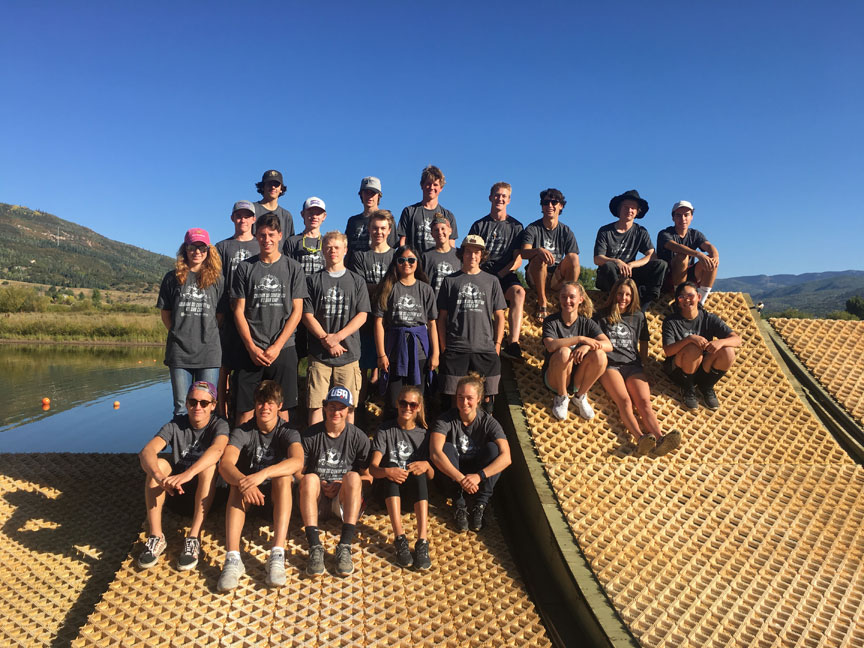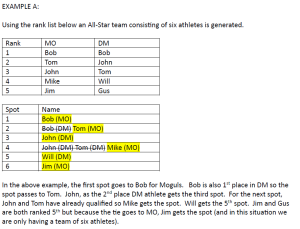Colorado Ski Country USA and The Rocky Mountain Division announce a Colorado All-Star Team. The Colorado All-Star Team represents the best skiers in Freestyle in the rocky Mountain Division. Colorado Ski Country USA has allotted 19 Gold Passes to Freestyle, good for unlimited skiing at each of their member resorts. After Vail Resorts withdrew from Colorado Ski Country USA, Vail Resorts also awarded Vail Resorts passes to All-Star Team athletes. Rocky Mountain Division (parent organization for Rocky Mountain Freestyle) provides 19 All-Star Team jackets or backpacks to the deserving athletes. The current Colorado Ski Country USA Freestyle All-Star Team size has 19 positions but could be reduced in the future.
The purpose of Colorado Ski Country USA’s All-Star Team is to help Colorado athletes with their training and competition expenses in “Going for the Gold.”
2023-2024 Selection Criteria
Eligibility Requirements
- Only Colorado residents with a Colorado mailing address are eligible. The athlete must have resided in Colorado for the prior three years. Three-year proof of Colorado residency is required.
- Athletes must have been active members of the US Ski & Snowboard Rocky Mountain Division (RMD) for the prior three years with no lapses in membership. RMD must be the home division for those three years and RMD divisional dues must have been paid. Athletes must have competed in two Rocky Mountain Freestyle events and the RMF Divisional Championships for each of those three years. Members must be in good standing with US Ski & Snowboard and RMD.
- Current US Ski Team members are ineligible.
- Athletes competing in FIS level competitions must have listed the United States as their country of affiliation.
All-Star Team Composition
- The RMD All-Star Team will consist of 20 athletes identified using the selection criteria below.
- The number of spots for male versus female athletes shall be determined by the ratio of total male to female athletes registered with USSS Freestyle Moguls at the time of publication of the initial FFSP list for the season, provided that no less than eight spots shall be assigned to each gender.
- In addition to these 20 athletes, three (3) athletes from each gender shall be assigned as alternates.
- In the event that a selected athlete declines his or her spot or is otherwise determined to be ineligible by the end of the fall All-Star camp, that spot shall be assigned to an alternate from the same gender. If open spots remain after all alternates for a given gender are awarded a position, those open spot shall pass to any remaining alternates from the opposite gender.
- Athletes identified as alternates will be expected to attend the fall camp but are not eligible for other benefits of the All-Star program unless a spot becomes open. Should more then 20 season passes be provided to RMF for distribution to the All-Star team, alternates will be given first consideration for these passes and are then expected to meet all of the requirements noted below.
- If an athlete withdraws or is deemed ineligible after the conclusion of the fall camp, that spot shall not be reassigned.
Selection Criteria
- RMF will create a ranking list for eligible athletes at the conclusion of the competition season.
- Any athlete who is notified of potential eligibility and chooses to decline participation or is otherwise determined to be ineligible for consideration will be removed from the rank list and not counted when assigning spots.
- The points used for the rank list shall be calculated as follows:
- For divisional events, the FFSP score shall be used:
- For FIS events which have an assigned FFSP value, that score shall be used.
- For FIS events occurring in North America for which there is not an assigned FFSP valuation (i.e. NorAm events), a point value will be assigned using the same formula used to assign FFSP for US Selections as defined in the current Freestyle and Freeski Completion Guide.
- Results from the Junior National competition will not be factored into the rank list.
- The rank list shall be created using the sum of the best three scores for the competition season. At a minimum, one of these scores must come from a RMF event.
- Separate rank lists shall be created for Moguls (MO) and Dual Moguls (DM) and for each gender.
- Spots shall be filled from the highest rank in MO, highest rank in DM, 2nd MO, 2nd DM on down until all spots (including alternates) are filled for a given gender. In the event of a tie the spot would go to MO. No athlete will be assigned to more than one spot.
- If an athlete has already qualified for All-Stars based on the other discipline that spot shall be filled by the next highest-ranking athlete, regardless of discipline (see Example A below).
- Validity of the list will be checked by the Rules and Officials representative to the RMF Board of Directors. It will also be verified by a minimum of two other board members. The Board Chair will assign members to this role. The list will be published only once this validation is complete.
- Athletes will be required to accept their position and provide verification of eligibility within 30 days of notification of selection. If an athlete does not accept a spot, it will pass to an alternate.
Participation Requirements
Membership on the All-Star Team comes with the following requirements:
- Attendance at the fall All-Star Camp and completion of the physical assessment is required. Athletes who are temporarily injured or ill are still required to attend the physical assessment to help conduct the tests unless such attendance would pose a threat to the health or safety of themselves, or others, as documented by a physician. The expected duration of the injury or illness must be such that it will not be expected to prevent an athlete from fulfilling the other responsibilities of the All-Star Team during the regular ski season. The injury cannot be a “season-ending” one that would prevent an athlete from competing normally during the upcoming ski season.
- Athletes must agree to a Code of Conduct and sign an acknowledgment of that Code of Conduct.
- Athletes must write thank-you letters to Colorado Ski Country USA and Vail Resorts prior to receiving their season passes from these organizations. Additional notes may be required for other sponsors.
- Athletes are required to compete in a minimum of three (3) Rocky Mountain Freestyle Competitive Series events during the competition season. One of those events must be the Rocky Mountain Freestyle Division Championship. An event is defined as one result on the appropriate US Ski & Snowboard Points List.
- If an athlete suffers an injury or illness that would prevent him or her from fulfilling the three-competition requirement (e.g. a season-ending injury), he or she must provide medical documentation supporting this condition. Depending on the nature and severity of the injury or illness, the athlete may be asked to surrender their All-Star Team passes. An athlete who fulfills the terms of this exemption may qualify for the next season’s All-Star Team if he or she meets the Eligibility Requirements as outlined above. The ranking list will not be adjusted due to the injury of an athlete.
- Athletes who accept their position on the All-Star Team and fail to fulfill the requirements may have their season passes invalidated and will be ineligible for the All-Star Team for a period of three (3) years, even if all other requirements are met.
Governance
- The All-Stars program is governed by the RMF Board of Directors through the All-Star program committee.
- The All-Star program committee is responsible for final interpretation of the program criteria, the granting of exceptions to program criteria, as well as resolution of any questions or disputes which may arise regarding these criteria.
- Coaches, athletes, or parents with questions about the All-Star criteria should direct these questions to the chair of the All-Star committee.

